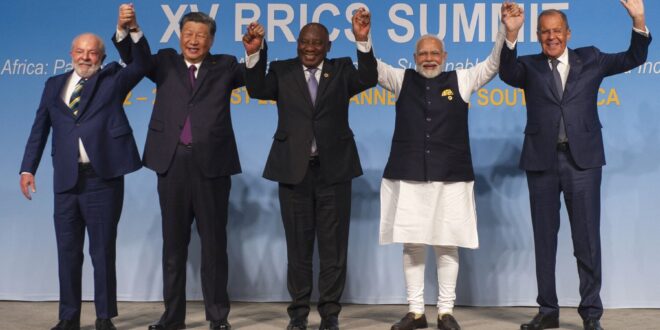At their recent summit, governments of the five BRICS nations — Brazil, Russia, India, China and South Africa — invited six more to join their group. Adding Argentina, Egypt, Ethiopia, Iran, Saudi Arabia and the United Arab Emirates won’t mark the end of their effort to enlarge the pact, they say. It’s only the first stage of a wider expansion intended to give developing nations more say in global governance.
The new group won’t find aligning members’ interests and policies any easier than the old one did. Most likely, the enlargement will make effective coordination even harder. In that sense, the announcement is less momentous than its authors would like to believe. Yet this is hardly a nonevent. It could weaken existing channels of cooperation at a time when collective action on global threats has never been more urgent. The growing appetite for an alternative to the prevailing international order is important in itself — and marks a failure of US leadership.
China is the main architect and long-time advocate of the expansion, seeing it as a way to exercise its own economic and geopolitical leadership. Russia, eager to find new economic partners and defray the costs of its war on Ukraine, was also enthusiastic. Although the other BRICS initially had doubts, not wanting to see the group align more firmly against the US and its Group of Seven partners, they agreed to the enlargement regardless. Despite their differences, the BRICS-11 evidently agree that current global rules and institutions don’t adequately serve their interests.
The scope for the group to do better is limited at best. In 2016, members established a joint liquidity facility, allowing them to lend to each other in emergencies, offering an alternative to the International Monetary Fund. They set up the New Development Bank modeled on the World Bank, and China funded infrastructure programs as part of its “Belt and Road” initiative. They’ve hoped to develop new trading arrangements outside the ambit of the World Trade Organization. They’ve even talked about creating a new currency that might somehow shield them from the dominance of the US dollar.
So far, when it comes to promoting stability and enlarging their economic potential, these efforts have made next to no difference. Worse, in sidelining the existing institutions, they’ve made genuinely multilateral cooperation harder.
In some ways, though, the discontent is justified. It’s no coincidence that the BRICS-11 arrives following the US turn away from economic leadership — accelerated by Donald Trump’s administration and affirmed by Joe Biden’s. The IMF and World Bank are increasingly rudderless. The WTO is all but defunct, as good as shut down by US obstruction. The organizing principle of US policy is no longer global prosperity but “Made in America.” Emerging economies can be forgiven for seeking alternatives to a global order that seems to put them last.
The timing of this shift couldn’t be worse. Higher interest rates are adding to the financial stresses confronting many low- and middle-income countries. If a new global debt crisis lies ahead, the damage won’t be narrowly confined. The costs of climate change are mounting, and the efforts of the once-and-future BRICS in containing them will be pivotal. These challenges are unavoidably global and demand a cooperative global response.
All this makes the fracturing of the multilateral order truly dangerous. Prodded by the BRICS enlargement, the US and its partners should work urgently to repair it.
 Eurasia Press & News
Eurasia Press & News



